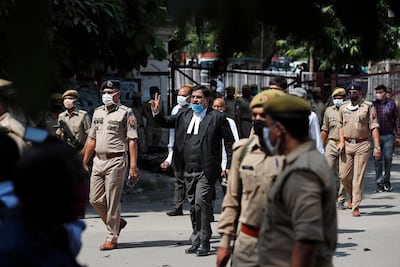An Indian court on Wednesday acquitted top ruling party leaders of conspiracy related to the mob demolition of a mosque decades ago that sparked communal riots which left more than 2,000 dead.
Tens of thousands of supporters of the Hindu-nationalist Bharatiya Janata Party (BJP) and other Hindu groups, armed with pick-axes and spades, tore down the 16th-century Babri Masjid in Ayodhya in 1992, to pave the way for a temple.
Many Hindus say the small patch of land where it stood is the birthplace of their revered god Ram, and the site has become a symbol of India's Hindu-Muslim divide.
The mob was allegedly led by top BJP leaders, including India's former deputy prime minister Lal Krishna Advani, former party president Murli Manohar Joshi, and Uma Bharti.
They were later accused of conspiring to destroy the mosque, with more than 30 BJP leaders facing charges of criminal conspiracy, promoting enmity and inciting the mob.
But a special court sitting in the northern city of Lucknow said on Wednesday the prosecution had failed to prove their guilt.
"Anti-social elements brought down the structure. The accused leaders tried to stop these people," the judge said as he announced the verdict.
"The audio of the speeches were also not clear. All accused are acquitted."
Seventeen accused died during the case and trial, which spanned nearly three decades.
Devout Hindus believe Lord Ram, the warrior god, was born in Ayodhya some 7,000 years ago but that the mosque – built during the time of Mughal ruler Babar – was constructed on top of his birthplace.

In the late 1980s, the BJP – currently led by Prime Minister Narendra Modi – launched a nationwide campaign to garner support for the construction of a temple for Lord Ram.
Mr Advani, now 92, led tens of thousands of supporters on a months-long street agitation across the country before the mob targeted the mosque.
The razing of the religious structure sparked India's worst sectarian riots and a protracted court case over the site.
Last year the Supreme Court awarded the land to a trust, clearing the way for the construction of a temple – a key victory for Mr Modi and BJP supporters.
Mr Modi, once a close confidant of Mr Advani, laid the foundation stone for the temple in August. The building of the temple was central to the platform of the BJP and the party's electoral fortunes rose following the agitation.
The top court had termed the demolition "unlawful", years after it upheld that the accused should be tried for conspiracy.
Mr Advani, who watched the judgement via video link, previously termed the demolition the "saddest day of his life".
But on Wednesday, the nonagenarian "wholeheartedly welcomed" the ruling, declaring "Jai Sri Ram (Hail Lord Ram)".
"The judgement vindicates my personal and BJP's belief and commitment toward the Ram Janmabhoomi movement (Ram temple construction movement)," he told reporters.
Opposition parties and Muslim groups criticised the acquittals.
The main opposition Congress party said the judgement was contrary to the Supreme Court's earlier stance and that the BJP had planned to "destroy the country's communal amity".
The All India Muslim Personal Law Board, which represents Muslim social and political groups, said it would challenge the acquittal in a higher court, calling it "far from justice".

